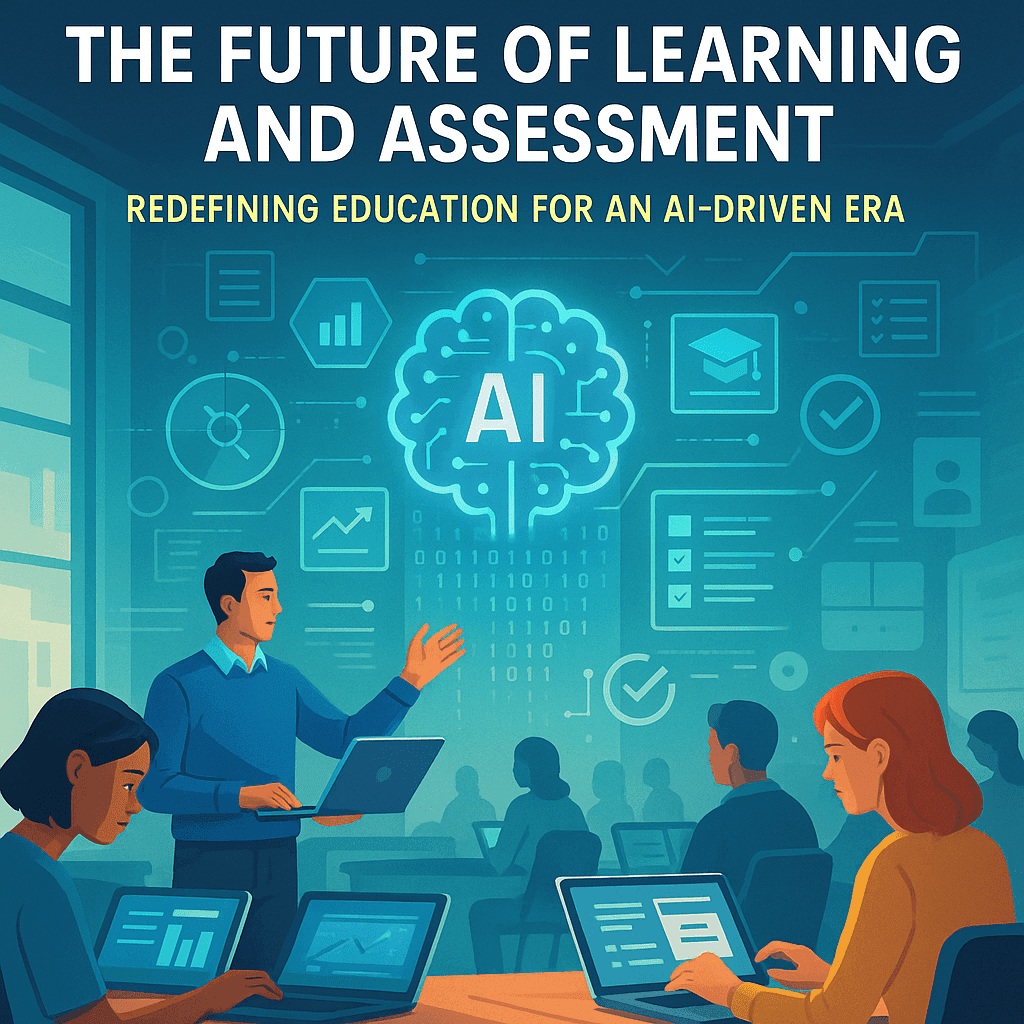
The world of education is undergoing a profound transformation. Learners are no longer bound by rigid curricula or standardised testing methods. With the rise of artificial intelligence, data analytics, and personalised platforms, we are entering an era where learning is more adaptive, inclusive, and student-centered than ever before.
This guide explores how educational institutions can reimagine learning and assessment to align with the demands of the 21st century and how educators can future-proof their practice in the process.
Essential Guide: What Is Generative AI and Why Should Educators Care?
1. What Is Driving the Future of Learning?
Three key forces are reshaping learning:
Digital Transformation
Learning is increasingly virtual, mobile, and on-demand. MOOCs, micro-credentials, and flipped classrooms are becoming the norm, allowing learners to choose when, where, and how they learn.
AI and Automation
AI is now embedded in tutoring systems, assessment design, and curriculum recommendations. From real-time feedback to personalised learning pathways, automation is powering individualised experiences.
Equity and Access Demands
There's a growing focus on inclusive pedagogy learning must work for all, including students from marginalised backgrounds, neurodiverse learners, and those in underserved regions.
2. Rethinking Assessment in the AI Era
Traditional assessments—fixed tests, time-bound essays—fail to capture 21st-century competencies. The future demands more agile, continuous, and formative assessment systems.
Continuous Feedback Loops
Tools like AI-enhanced writing platforms provide real-time feedback on grammar, structure, and clarity. Students can improve iteratively rather than wait for grades.
Authentic and Performance-Based Assessment
Instead of a written exam, students might:
- Simulate a business decision
- Solve a live data set
- Create a pitch deck or video presentation
These formats measure application, not just knowledge.
Metacognitive Assessment
Emerging systems now measure how students think: reflection journals, AI that prompts reasoning pathways, and tools that assess the learning process not just the outcome.
3. Emerging Trends Shaping Future Learning Models
| Trend | Description | Application |
|---|---|---|
| Competency-Based Learning | Students progress when they demonstrate mastery, not by time spent. | Digital badges, modular curriculums |
| AI-Curated Content | Learning platforms dynamically recommend content based on learner performance. | Edtech tools like Squirrel AI, Century Tech |
| Agentic Learning | Learners take ownership through choices, feedback, and personal goal setting. | Goal tracking dashboards, reflection prompts |
| Blockchain Credentialing | Transparent, verifiable, and stackable credentials. | Issuing digital diplomas or skills passports |
4. Designing for the Future: What Educators Can Do Today
1. Embrace Assessment Diversity
Incorporate:
- Peer-reviewed projects
- Real-world problem-solving
- Interactive discussions scored via rubrics
2. Redesign Learning Outcomes
Outcomes should reflect higher-order thinking and transferable skills, e.g.:
- “Evaluate the sustainability of a supply chain model”
- “Design and defend a pricing strategy for a startup”
3. Align Tools with Purpose
Don’t adopt AI for the sake of it. Use:
- ChatGPT for draft generation and critique
- Turnitin not just for detection but for citation coaching
- Rubric-based auto-scoring for formative tasks
4. Foster Learner Autonomy
Use scaffolding strategies that gradually shift responsibility to students:
- Checklists for self-review
- Prompts for peer feedback
- Goal-setting templates
5. Challenges to Address
Transformation isn’t without hurdles:
- Digital Inequality: Not all students have equal access to devices or bandwidth.
- Assessment Validity: How do we ensure AI-driven assessments are fair, valid, and secure?
- Faculty Readiness: Many educators require support to adapt pedagogies, design new tasks, and evaluate tech tools effectively.
Institutions must balance innovation with infrastructure and professional development.
6. Success Story Example
In a mid-sized university business school, faculty redesigned their core marketing assessment. Instead of a written exam, students worked in teams to launch a simulated product using a digital marketing platform. AI tools gave real-time feedback on campaign effectiveness, and students wrote reflections on their strategic decisions. The result: higher engagement, stronger critical thinking scores, and fewer academic integrity issues.
Visit The Case HQ for 95+ courses
Read More:
Critical Role of AI Tools in Preserving Academic Integrity in Education
Powerful Tools and Techniques for AI in Formative Assessment
Transforming Summative Assessments with AI: A Smarter Future for Education
How AI in Grading Rubrics Ensures Unmatched Consistency and Fairness in Education
Powerful Adaptive Learning Paths: How AI Tailors Assessments to Learners’ Needs
Revolutionary AI-Powered Assessment Tools Are Transforming Education Forever
Practical Applications of Generative AI in Education: Turning Innovation into Daily Practice
The Future of Learning and Assessment: Redefining Education for an AI-Driven Era
Designing the Future Faculty: A Practical Guide to Academic and Faculty Development
https://thecasehq.com/the-future-of-learning-and-assessment/?fsp_sid=1304
Comments
Post a Comment